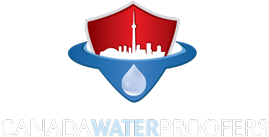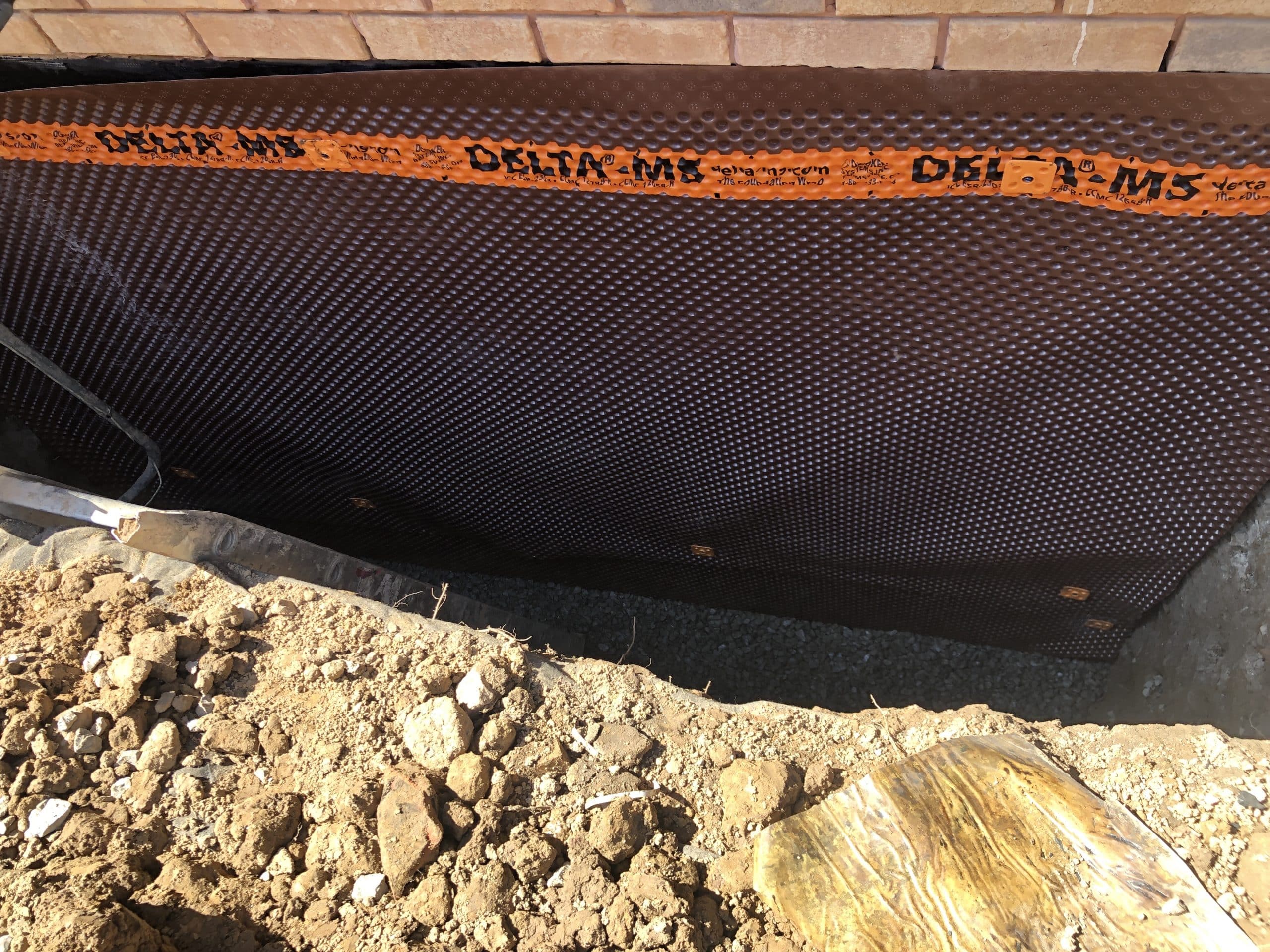Every year, homeowners across Toronto and the GTA face a familiar and frustrating problem, a wet basement. Whether it’s water leaking in after a heavy storm, seasonal seepage, or cracks forming in the foundation, the cause is often more complex than it seems.
It’s not just bad luck, it’s science.
In this blog, we’ll explore the real reasons behind wet basement repair in Toronto, Mississauga, Brampton, Vaughan, and other parts of the GTA, including how the region’s soil type, rainfall patterns, and older construction styles make homes more vulnerable to water damage. We’ll also explain how working with a trusted waterproofing company in the GTA, like Canada Waterproofers, can protect your home and your peace of mind.
From understanding what impacts basement waterproofing to its cost and choosing the right Toronto waterproofing contractors, we’ll cover everything you need to know to keep your basement dry, safe, and healthy for the long run.
The GTA’s Geology & Its Impact on Waterproofing
Wondering why so many basements in Toronto and the GTA end up wet or damp? One big reason is what’s under your home, the soil.
Here’s how the local ground conditions affect your basement:
1. Clay Soil and Shallow Water Tables
-
Most GTA areas have clay-heavy soil that holds water around the foundation.
-
Clay doesn’t drain well, so rainwater builds up near the basement walls.
-
In some places, the water table is close to the surface.
-
This adds pressure on basement walls and can cause leaks or a flooded basement in Toronto.
2. Urban Sprawl and Old Drainage Systems
-
More buildings mean less ground to absorb rainwater.
-
Old stormwater systems in Toronto can’t handle heavy rain.
-
Water builds up, leading to leaks in homes with poor or no waterproofing.
-
That’s why many homeowners rely on Toronto waterproofing companies like Canada Waterproofers to upgrade drainage and keep their basements dry.
3. Heat Islands and Freeze-Thaw Cycles
-
Heat from buildings causes quick snow melt and refreeze.
-
This leads to cracks in the foundation.
-
Water freezes in cracks, making them worse.
-
Over time, it causes basement leaks—even in dry weather.
4. Hydrostatic Pressure: The Hidden Cause of Basement Leaks
-
Saturated ground puts pressure on basement walls (hydrostatic pressure).
-
Even small cracks can let water in.
-
Basement waterproofing in Toronto uses sump pumps and weeping tiles to reduce pressure and prevent leaks.


Why Old Homes in Toronto Are at Greater Risk
Many homes in Toronto, especially those built between the 1930s and 1970s, were not designed to handle today’s water pressure. According to national housing data, around 35% of Canadian owner‑occupied homes were built before 1970—and nearly half before 1980. If you live in one of these older homes and notice moisture, damp walls, or musty smells, you may be at greater risk for a wet basement. Homes across the GTA, from GeorgeTown and Scarborough to Oakville and Pickering, experience these issues.
Here’s why:
1. No Waterproofing Membranes
- Back then, homes weren’t built with waterproofing membranes on the outside of the foundation.
- Without this layer, water can easily seep through basement walls.
2. Old or Broken Weeping Tiles
- Many older homes have clay weeping tiles that are now cracked or blocked.
- These tiles are supposed to drain water away, but when they stop working, water builds up around your home.
- This often leads to leaky or flooded basements in Toronto.
3. Basement Design Issues
- Older homes usually have shallow basements and thin foundation walls.
- There’s often no vapor barrier or proper drainage system.
- These design flaws make it easier for moisture to get in, especially in areas with clay soil and high water tables.
Every home is different. Soil conditions, foundation type, and basement depth all affect the right waterproofing approach. That’s why we don’t offer cookie-cutter solutions, we build a system that works for your home and budget.
— Slava, Waterproofing Expert at Canada Waterproofers
Science Behind Wet Basements in the GTA
If you’re facing a wet basement in Toronto, it’s not just due to heavy rain or old construction—there’s real science behind why water enters your home. Understanding how water behaves around your foundation helps you choose the right solution and the right waterproofing company in the GTA, like Canada Waterproofers.

Here’s a simple breakdown of the science that drives basement waterproofing in GTA:
1. Hydrostatic Pressure
- What it is: This is the pressure water in the soil puts on your foundation walls and floor.
- Why it matters in the GTA: With clay-heavy soil and high water tables, Toronto homes often face high water pressure during rain or snowmelt.
- The problem: This pressure pushes water through cracks or porous concrete, leading to leaks and flooding.
- Solution: Systems like French drains and sump pumps relieve that pressure and redirect water away from your basement.
2. Waterproofing Materials (Material Science)
- Membranes: Sheet-like barriers placed on the outside of foundation walls to stop water from getting in.
- Coatings & Sealants: Applied inside or outside to seal gaps and cracks.
- Crystalline waterproofing: Chemicals added to concrete that react with water and form crystals, blocking water paths internally.
- Capillary action: Water can be pulled up through porous concrete—materials are chosen to block this moisture movement.
These products are tailored based on moisture readings, which Canada Waterproofers use to choose the right system for your home.
3. Engineering Principles That Matter
- Proper grading: The land around your home should slope away from your foundation to prevent water pooling.
- Drainage systems: Sump pumps, weeping tiles, and interior drains remove water before it causes damage.
- Vapor barriers: Installed under basement floors or walls to block ground moisture.
- Ventilation & dehumidifiers: Help reduce indoor condensation and prevent mold and mildew.
4. Interior vs. Exterior Waterproofing
- Exterior waterproofing: Involves digging around your foundation and applying membranes and drainage outside.
- Interior waterproofing: Involves sealing cracks from inside and installing sump pumps or interior drains.
Canada Waterproofers offer both options, depending on the condition of your home, soil, and moisture levels. Not all Toronto waterproofing companies customize solutions—but Canada Waterproofers does.
Read More: How Much Does It Cost to Install Weeping Tiles in Toronto?
How does basement waterproofing work?
Wondering “what is the process of waterproofing a basement”? At Canada Waterproofers, we understand that older homes need special care. That’s why we create custom solutions based on the condition of your home and the surrounding soil.
Here’s what we do differently from many other Toronto waterproofing companies:
Soil Testing
- We check the type of soil around your home to see how much water it holds.
- Clay-heavy soil needs extra drainage to prevent pressure against your basement walls.
Moisture Readings
- We take moisture readings inside and outside your basement.
- Based on those results, we choose the right waterproofing membrane, some homes need thicker materials to stop water from getting in.
Custom Waterproofing Systems
- We don’t use the same solution for every house.
- Whether it’s interior waterproofing, exterior waterproofing, or both, we design a system that fits your home and budget.
- This also helps you get the most value for your basement waterproofing Toronto cost.
Know more: Discover why Canada Waterproofers is the Go-to for waterproofing services?
Real-Life Basement Waterproofing Toronto Reviews
We Thought It Was Just a Small Crack” — Sarah, North York
We noticed a small damp spot in the basement corner of our Toronto home, but didn’t think much of it. A few weeks later, it smelled musty and stains appeared. We called Canada Waterproofers—they found our weeping tiles were blocked and explained how hydrostatic pressure caused leaks. They installed an interior drainage system, and now our wet basement problem is gone!
I Didn’t Know Water Could Come Up Through the Floor” — Mark, Scarborough
After a heavy summer storm, I found water coming up through the basement floor—not the walls. I had no idea that could happen. A friend suggested Canada Waterproofers, and they explained how capillary action and hydrostatic pressure work. They installed a sump pump and weeping tiles, and now our basement waterproofing system keeps it totally dry, even in the worst storms.
You can check out our business profile and our reviews!
Ready to Keep Your Basement Dry?
A wet basement in Toronto isn’t just annoying, it can lead to serious structural damage, mold, and health issues.
Don’t wait for the next storm.
Still confused, Who to call for a wet basement? Canada Waterproofers, one of the most trusted Toronto waterproofing contractors, offers science-backed solutions and a team of experienced pros who treat your home like their own.
Book your FREE assessment today!
Email: Info@canadawaterproofers.com
Call: 416-333-LEAK (5325)
FAQs (From competitors)
Can Waterproofing Increase My Home’s Value?
Yes, it can. A dry, well-protected basement is something buyers look for. Waterproofing helps prevent damage, lowers energy bills, and makes your home more comfortable. All of this can raise the value of your home if you ever decide to sell.
Are There Eco-Friendly Waterproofing Options?
Yes, there are green waterproofing options. Some people use natural clay or eco-friendly sealants that don’t harm the environment. These options work well and are better for the planet.
What Should I Do After Waterproofing My Basement?
After the work is done, you still need to take care of your basement. Clean your gutters, check for any new cracks, and make sure your sump pump is working properly. A little regular care will help keep your basement dry in the long run.
How Long Does Basement Waterproofing Take?
In most cases, basement waterproofing takes around 1 to 3 days. The time depends on how big your basement is, how bad the water problem is, and what kind of waterproofing system is being used.
What is the best waterproofing method for the basement?
Exterior waterproofing is the most effective method. It stops water before it enters by sealing the outside foundation walls and adding proper drainage like weeping tiles.
Is it expensive to waterproof a basement?
It depends on the method and basement size. Interior systems are more affordable, while exterior waterproofing costs more but offers stronger protection. Think of it as a long-term investment.
Does waterproofing a basement really work?
Yes, when done properly. Waterproofing stops water from entering your basement and protects your home from future leaks, mold, and damage.
What is the life expectancy of basement waterproofing?
We at Canada Waterproofers give lifetime warranty on our services.
What is the cheapest basement waterproofing method?</b
The interior sealant method is usually the cheapest. It blocks water from the inside, but it’s more of a short-term fix compared to full exterior systems.
About the Author
Carl Mcdowell is a seasoned waterproofing specialist with 15+ years of experience protecting homes across the GTA. As a senior consultant at Canada Waterproofers, Carl combines technical knowledge with a passion for educating homeowners on how to safeguard their properties from water damage.











